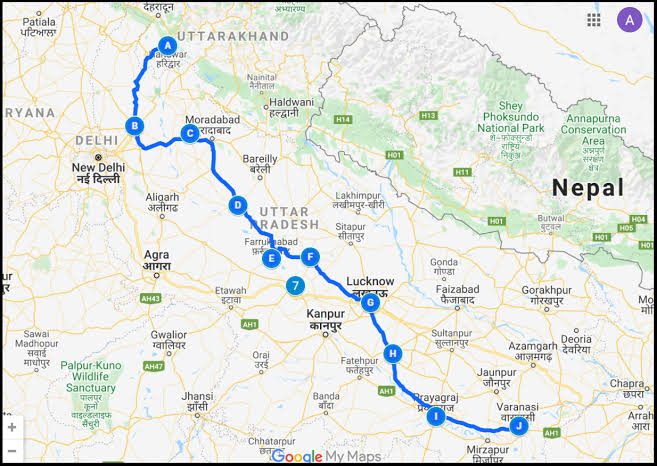In its second phase, the Ganga Expressway—the longest in Uttar Pradesh—will now connect to Varanasi, Ghazipur, and Ballia. Find out more about the latest changes to the route and the 75 Varanasi villages that will have their land acquired as part of this massive infrastructure project that will completely change the landscape of the area.
Introduction: Uttar Pradesh’s Turning Point
In Uttar Pradesh, a state already embarking on a revolutionary infrastructure route, the Ganga Expressway is expected to play a significant role in stimulating prosperity. The expressway will run 594 kilometers in its initial phase, connecting Prayagraj and Meerut. But the latest announcement of the second phase, which includes Varanasi, Ghazipur, and Ballia, has given this enormous project a new meaning. The second phase, which would span over 350 km, will improve connection and present new development opportunities for the 75 Varanasi villages that have been identified. 
An important step toward bettering trade, tourism, and industrial development, this second phase of Uttar Pradesh’s integration represents. We will go over the salient features of the route modifications, their effects on Varanasi’s villages, and the Ganga Expressway’s overall significance in this post.
The Ganga Expressway’s Mission
The Ganga Expressway is a vision for Uttar Pradesh’s future, not merely a route. Chief Minister Yogi Adityanath led the initiative to build the expressway, which intends to seamlessly connect the state’s eastern and western regions. By shortening the distance between Meerut and Prayagraj, this strategic project will improve the economic prospects of the towns and cities along the route.
Additionally, the project’s second phase, which will extend the expressway to Varanasi and Ballia, is anticipated to improve the state’s road network by connecting important centers of pilgrimage, commerce, and culture. This development is in line with the government’s overarching objective of making Uttar Pradesh a thriving center of tourism, industry, and connectivity.
The Ganga Expressway’s Route: Extensions and Phases
The initial plan for the Ganga Expressway’s first phase, which runs from Meerut to Prayagraj, was for a 594-kilometer journey. With Prime Minister Narendra Modi scheduled to open it, this phase is anticipated to be finished by February 2025. But there’s more enthusiasm now because of the second phase’s recent developments.
The Second Stage: Ballia to Varanasi
The expressway will run from Prayagraj to Varanasi in its second phase, with stops along the way in Mirzapur, Bhadohi, Ghazipur, and Ballia. At first, it was suggested that the expressway would run from Prayagraj to Mirzapur and then connect to the Ring Road of Varanasi. The path has been altered, though. There will be no need to build a bridge over the Ganga River because the highway will now traverse a 10-kilometer-wide area along its left bank.
This planned route modification will simplify the expressway’s integration with current road networks and lessen construction complexity, improving accessibility to isolated parts of eastern Uttar Pradesh.
75 Varanasi Villages Have Been Selected for Land Acquisition
The effects of the second phase of the Ganga Expressway on the Varanasi villages are among its most important features. For the purpose of acquiring land, 75 villages from the Pindra and Sadar tehsils of Varanasi have been identified. Notifications of land purchase have been issued by the Uttar Pradesh Expressways Industrial Development Authority (UPEIDA) after the required surveys were finished.
Villages in Pindra Tehsil Affected
Among the villages in Pindra tehsil designated for land acquisition are Paranapur, Arazichandravati, Raipura, Gurwat, and Kanakpur Tewaripur. The development of the highway will cause major changes in the land usage of these settlements, which are primarily agricultural. Due to the expressway’s close vicinity to these communities, new economic opportunities should arise, but there is also a chance that the current agrarian way of life may be challenged.
Villages in Sadar Tehsil Affected
A similar procedure is in progress in Sadar tehsil. Important villages that have been identified for acquisition include Kallipur, Rajuari, Pandeypur, Rakhauna, and Khajuri. Some of the most populous areas will be traversed by the highway, and the administration has taken the initiative to allay landowner worries.
The local population may face difficulties as a result of this acquisition, but UPEIDA has promised that just compensation will be given, protecting the livelihoods of the people living there. Furthermore, the highway is expected to significantly improve these villages’ transportation connectivity and attract possible industrial investments.
Route Adjustment: Essential Information and Advantages
There are various advantages to the route modifications made in the second phase of the Ganga Expressway. The expressway will no longer need a bridge to cross the Ganga River, as was previously claimed. This revised plan aims to ensure that the highway stays within a 10-kilometer radius of the left bank of the Ganga, streamline the project, and save construction expenses.
Effect on Accessibility and Connectivity
Accessibility for areas that previously experienced transportation issues will be enhanced by the new route. Now that the highway is passing through key areas like Bhadohi and Ghazipur, these cities will be easier to visit and will experience economic growth. Given Varanasi’s prominence as a religious and cultural centre, this move will also contribute to an increase in tourism. Traveling on pilgrimages to Varanasi, Prayagraj, and Ballia will be simpler with better road infrastructure.
A further benefit is that one of the trickiest construction obstacles is removed because there won’t be a Ganga bridge in the second phase. Maintaining the expressway in line with the river’s natural channel will expedite project completion, save costs, and minimize environmental effects.
The Region’s Economic and Social Impact
The Ganga Expressway is anticipated to have a major impact on Uttar Pradesh’s economy. The expressway will have a knock-on effect on a number of industries, from increasing trade and commerce to improving tourism.
Encouragement of Local Industry and Trade
Major industrial and agricultural areas will be connected to markets throughout the state and beyond by the highway. Previously underserved by road infrastructure cities like Ghazipur and Ballia will now find themselves at the center of a new trade corridor. Faster movement of goods and services will be made possible by this improved connectivity, which will support the expansion of the local economy.
Opportunities for Job Creation and Development
Thousands of employment will be created by the Ganga Expressway construction, both while and after the project is finished. There will be a sharp rise in the need for technicians, engineers, skilled labor, and construction workers. Long-term advantages also include the expansion of enterprises and industries along the expressway route, which will create more job opportunities.
This change may result in new jobs in the retail, tourism, and logistics industries replacing traditional agricultural techniques in the 75 villages that make up Varanasi. Even though the shift will not be easy, economic growth is predicted overall.
Effects on Land Use and Agriculture
Concerns regarding the effects of land acquisition on agriculture are unavoidable, especially for people whose livelihoods depend on farming. However, UPEIDA has been working to guarantee that farmers are fairly compensated, and as the expressway brings new businesses and services to the region, there will be prospects for alternative employment. 
Furthermore, the expressway will give farmers quicker access to markets so they can transport their produce more effectively, perhaps increasing profitability and lowering the amount of perishable goods that deteriorate.
Sustainability and Environmental Aspects
Environmental issues are frequently raised by large-scale infrastructure projects, such as the Ganga Expressway, particularly in ecologically delicate areas like the Ganga basin. To reduce the expressway’s negative environmental effects, the government and UPEIDA have taken action.
Reducing Interruptions to the Environment
The expressway will lessen its environmental impact by changing its course to avoid the need for a Ganga bridge. Additionally, the project has been planned to avoid sensitive areas and adhere to the current land contours. In order to make sure that the expressway won’t negatively effect the surrounding ecosystems, such as agricultural land and riverine habitats, environmental impact evaluations have been done.
Encouragement of Green Practices
UPEIDA has also placed a strong emphasis on sustainability during the building phase. Strategies including collecting rainwater, using environmentally friendly building materials, and utilizing renewable energy sources when building are being put into practice. In order to promote energy efficiency, the expressway will also have solar-powered lights in strategic locations.
Establishment of Infrastructure Along the Ganga Expressway
The Ganga Expressway aims to promote integrated development along its course in addition to expedited transport. The project will support the establishment of new townships, industrial zones, and logistical hubs in addition to building roads.
Combined Industrial Corridors and Townships
Along the expressway corridor, UPEIDA has planned the building of integrated townships that will act as centers for business, industry, and residential activity. These communities will be furnished with contemporary conveniences, drawing in enterprises and locals alike. The manufacturing, logistics, and agro-processing industries will be the main focus of the industrial corridors that run beside the freeway.
Improved Facilities for Travel
Three significant locations for religious and cultural tourism are Varanasi, Prayagraj, and Ballia. Traveler flow will be facilitated by the highway, especially at the busiest times of the year for pilgrimages. Local economies will be boosted by the construction of hotels, restaurants, and other tourism-related services along the route, which will result from improved road infrastructure.
Schedule and Prospects for the Future
By February 2025, the first section of the Ganga Expressway—which runs from Meerut to Prayagraj—should be finished. The subsequent stage, which involves
Due to the ongoing land acquisition and environmental clearance processes, the route to Varanasi, Ghazipur, and Ballia is expected to take longer than expected. But when it’s all said and done, the highway will be one of the longest in India, spanning more than 940 kilometers. 
In the long run, the highway will act as the foundation for the expansion of the region’s infrastructure. Uttar Pradesh’s economic and social landscape is predicted to change as a result of the Ganga Expressway’s ambitions for increased urbanization, industry, and connectivity.
Final Thoughts: A New Era of Growth and Connectivity
For the inhabitants of Uttar Pradesh, the Ganga Expressway is more than simply a highway—it’s their lifeblood. It has the potential to significantly improve the region’s social, economic, and environmental conditions if it is extended to Varanasi and Ballia. The purchase of land in 75 Varanasi villages marks the start of a new phase in the state’s growth. As the project moves forward, millions of people around the state stand to gain new opportunities, better trade, increased employment, and enhanced tourism.
The Ganga Expressway’s forward-thinking outlook will be crucial in determining Uttar Pradesh’s economic success for many years to come.
Bhadani Mirror Weekly News Paper
Kashi Yatri – Discover Kashi at its Best







